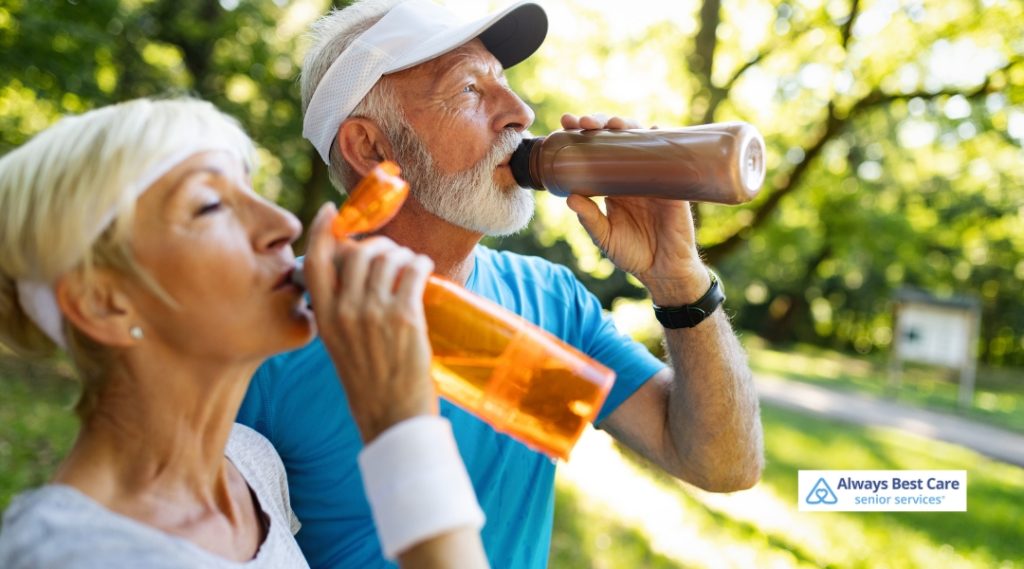Water Wisdom for Seniors: Unlocking the Secrets to Healthy Aging

Let’s face it—staying properly hydrated isn’t just good advice; it’s a necessity, especially for our older loved ones.
As we age, our bodies undergo natural changes that can significantly increase the risk of dehydration.
Yet, many seniors simply don’t drink enough water throughout the day.
With National Hydration Day coming up on June 23rd, 2025, there’s no better time to shine a light on this critical issue and encourage better drinking habits among our elderly population.
Whether it’s due to a diminished sense of thirst, medication side effects, or mobility issues that make getting to the kitchen a challenge, seniors often find themselves vulnerable to dehydration’s sneaky effects. Understanding water’s vital role can help families and caregivers keep their older loved ones healthy, alert, and full of energy.
What you will learn:
- Why hydration is essential for seniors and the key health benefits it provides, from boosting energy to supporting brain and digestive health.
- Common reasons older adults are at higher risk for dehydration and practical strategies to help them stay hydrated every day.
- How caregivers and family members can support seniors in maintaining healthy hydration habits, including helpful tips and available care services.
Table of Contents
Why Hydration Matters for Senior Health
Water makes up over half of the human body and plays a starring role in nearly every bodily function.
For seniors, keeping properly hydrated is essential for several key reasons:
Energy and Vitality
You know that mid-afternoon slump?
For seniors experiencing even mild dehydration, that feeling can last all day long.
Seniors might already deal with lower energy levels due to age-related changes, so a lack of fluids can make them feel like they’re running on empty.
Good hydration helps maintain proper blood volume and transports oxygen more efficiently, giving seniors the stamina they need for daily activities.

Brain Function and Mental Clarity
Ever felt foggy-headed when you haven’t had enough to drink? Dehydration can mess with mental clarity, concentration, and memory.
For seniors, particularly those already navigating cognitive challenges or dementia, insufficient fluid intake might contribute to increased confusion or disorientation.
Drinking enough water supports brain function and helps maintain a sharper, more focused mind.
Digestive Wellness
Water’s a real MVP when it comes to digestion and preventing constipation, which frequently troubles seniors. Fluids help soften stool and keep things moving through the digestive tract.
Without adequate water, digestion slows to a crawl, causing discomfort and other issues that can impact appetite and nutritional health.
Joint and Muscle Health
Think of hydration as nature’s lubricant for muscles and joints. Seniors who stay well-hydrated often experience less stiffness and joint discomfort, helping them stay more active and mobile in their daily lives.
5 Practical Tips for Boosting Hydration
If your loved one struggles to drink enough water, here are some down-to-earth approaches that really work:
- Mix it up with hydrating alternatives like herbal teas, milk, broth-based soups, or water infused with fruits and herbs.
- Serve water-rich foods such as watermelon, cucumber, oranges, and strawberries.
- Set friendly reminders to sip water throughout the day, especially with meals or medications.
- Use attractive or easy-to-grip cups and water bottles to make hydration more appealing and accessible.
- Check urine color; pale yellow typically signals proper hydration, while darker urine suggests more fluids are needed.

How Always Best Care Can Help
When staying hydrated becomes a concern for your aging family member, in-home care services from Always Best Care can make all the difference in the world.
Our professional caregivers assist with meal preparation, provide regular hydration reminders, and keep an eye out for signs of dehydration. We can also help address common barriers like bathroom accessibility or managing medications that might affect fluid levels.
Frequently Asked Questions
Q: How much water should seniors drink daily?
A: While needs vary by individual, most health experts recommend seniors aim for 7-8 cups of fluids daily, adjusting based on activity level, medications, and health conditions.
Q: What are the warning signs of dehydration in seniors?
A: Watch for dry mouth, fatigue, dizziness, confusion, less frequent urination, dark urine, and increased thirst.
Q: Can coffee and tea count toward daily fluid intake?
A: Yes, though they’re mildly diuretic, they still contribute to overall hydration. Balancing them with plain water is ideal.
Q: How can I help a senior who doesn’t like drinking water?
A: Try flavoring water with fruits, offering water-rich foods, using appealing drinkware, or finding acceptable alternatives like herbal tea or diluted juice.

Stay Refreshed, Stay Healthy—Hydration Tips for Seniors in Chapel Hill!
Hydration might seem like a small detail in the grand scheme of senior care, but it’s one of those fundamentals that affects everything else. At Always Best Care, we’re passionate about helping seniors maintain their health through proper hydration and comprehensive care services.
Contact Always Best Care of Chapel Hill at (336) 948-9152 to learn more and schedule your free consultation.





